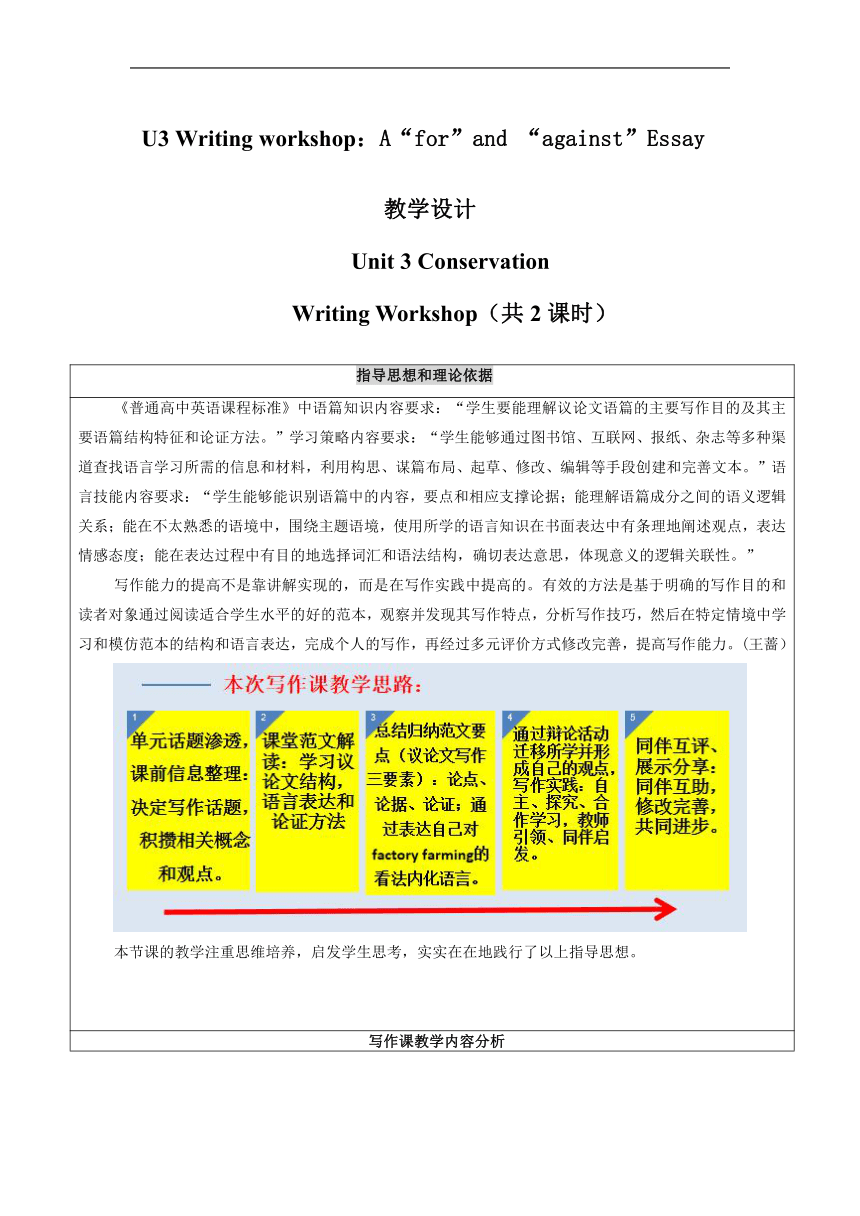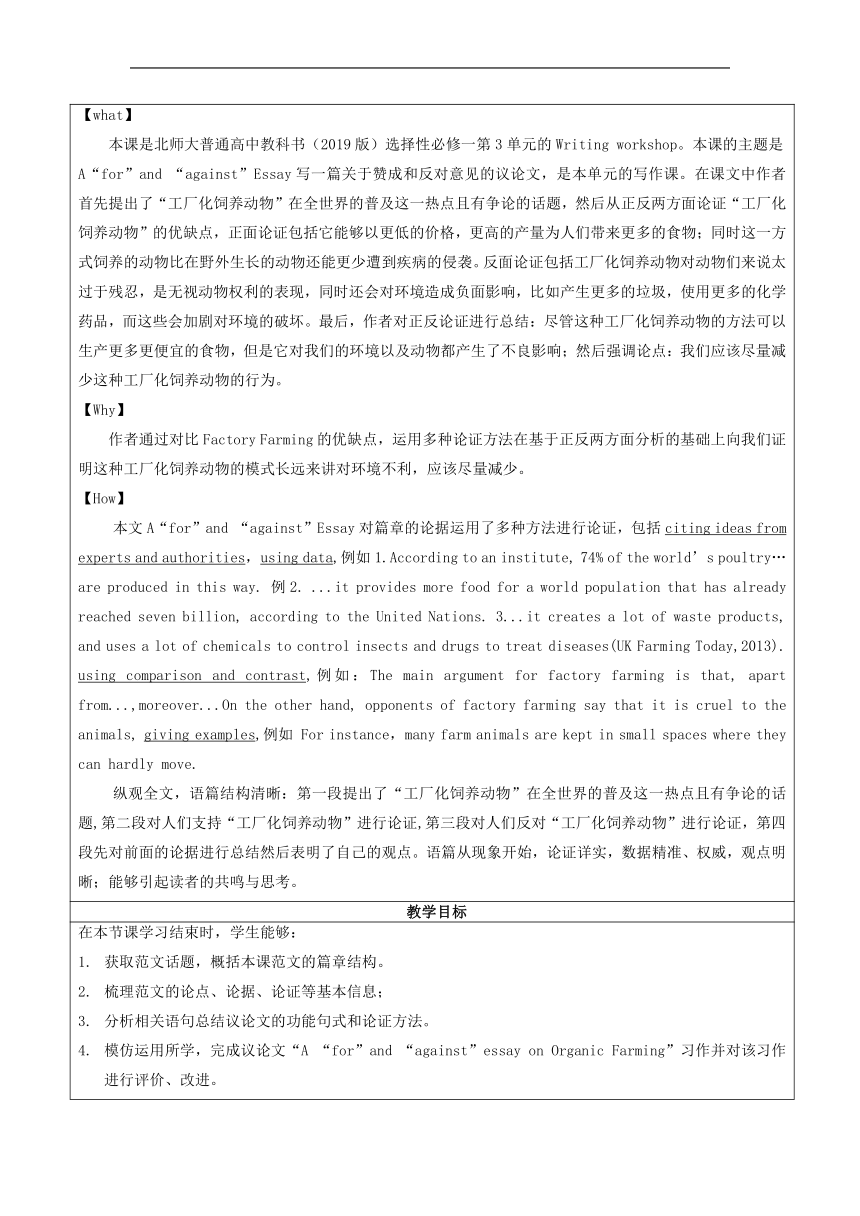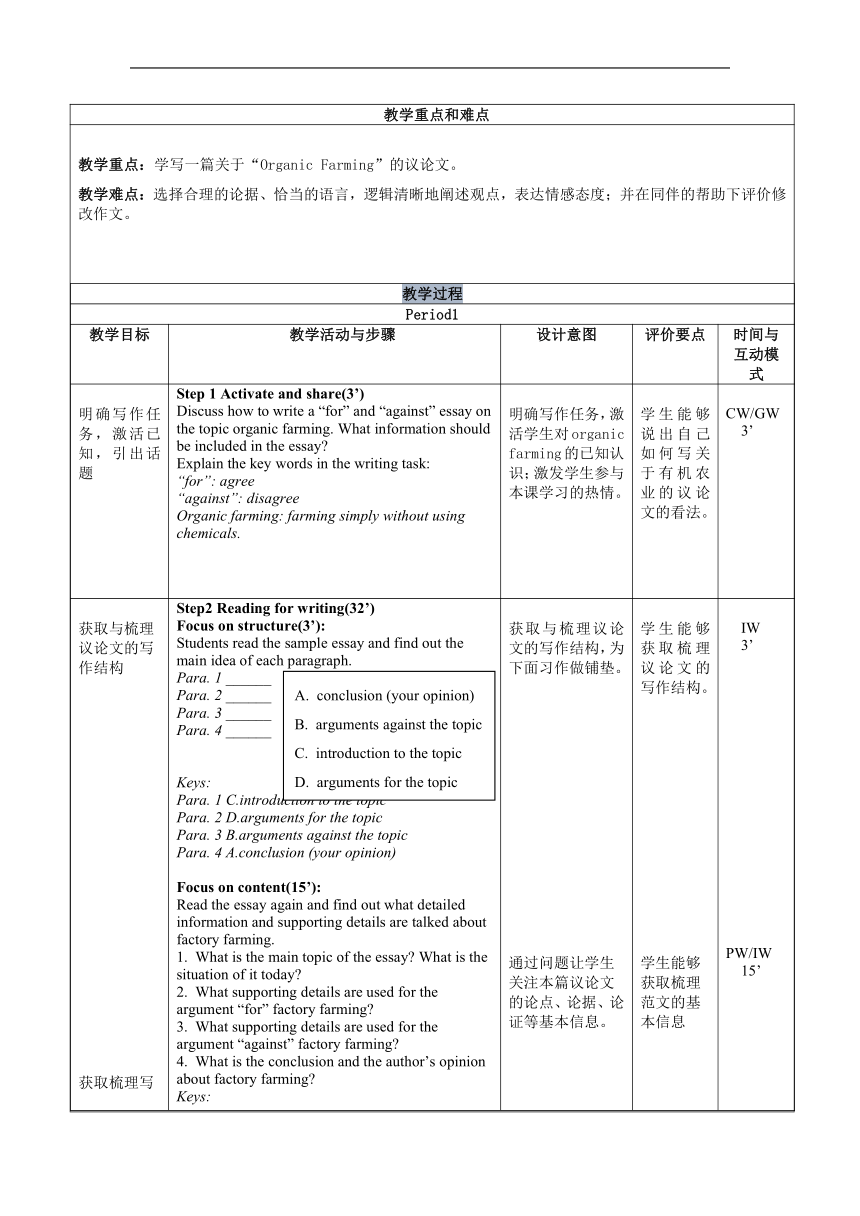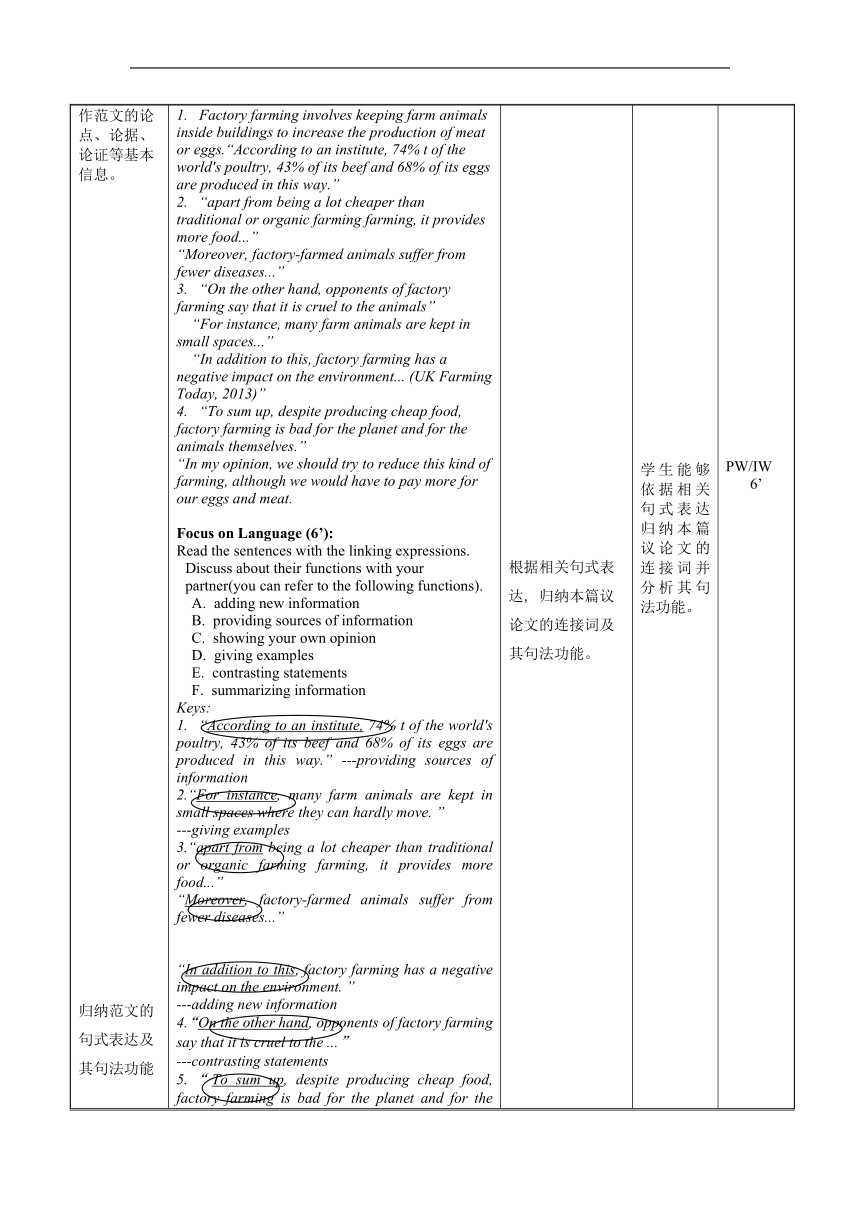Unit 3 Conservation Writing Workshop 教学设计(2课时,表格式)
文档属性
| 名称 | Unit 3 Conservation Writing Workshop 教学设计(2课时,表格式) |

|
|
| 格式 | docx | ||
| 文件大小 | 351.1KB | ||
| 资源类型 | 教案 | ||
| 版本资源 | 北师大版(2019) | ||
| 科目 | 英语 | ||
| 更新时间 | 2022-09-29 00:00:00 | ||
图片预览




文档简介
U3 Writing workshop:A“for”and “against”Essay
教学设计
Unit 3 Conservation
Writing Workshop(共2课时)
指导思想和理论依据
《普通高中英语课程标准》中语篇知识内容要求:“学生要能理解议论文语篇的主要写作目的及其主要语篇结构特征和论证方法。”学习策略内容要求:“学生能够通过图书馆、互联网、报纸、杂志等多种渠道查找语言学习所需的信息和材料,利用构思、谋篇布局、起草、修改、编辑等手段创建和完善文本。”语言技能内容要求:“学生能够能识别语篇中的内容,要点和相应支撑论据;能理解语篇成分之间的语义逻辑关系;能在不太熟悉的语境中,围绕主题语境,使用所学的语言知识在书面表达中有条理地阐述观点,表达情感态度;能在表达过程中有目的地选择词汇和语法结构,确切表达意思,体现意义的逻辑关联性。” 写作能力的提高不是靠讲解实现的,而是在写作实践中提高的。有效的方法是基于明确的写作目的和读者对象通过阅读适合学生水平的好的范本,观察并发现其写作特点,分析写作技巧,然后在特定情境中学习和模仿范本的结构和语言表达,完成个人的写作,再经过多元评价方式修改完善,提高写作能力。(王蔷) 本节课的教学注重思维培养,启发学生思考,实实在在地践行了以上指导思想。
写作课教学内容分析
【what】 本课是北师大普通高中教科书(2019版)选择性必修一第3单元的Writing workshop。本课的主题是A“for”and “against”Essay写一篇关于赞成和反对意见的议论文,是本单元的写作课。在课文中作者首先提出了“工厂化饲养动物”在全世界的普及这一热点且有争论的话题,然后从正反两方面论证“工厂化饲养动物”的优缺点,正面论证包括它能够以更低的价格,更高的产量为人们带来更多的食物;同时这一方式饲养的动物比在野外生长的动物还能更少遭到疾病的侵袭。反面论证包括工厂化饲养动物对动物们来说太过于残忍,是无视动物权利的表现,同时还会对环境造成负面影响,比如产生更多的垃圾,使用更多的化学药品,而这些会加剧对环境的破坏。最后,作者对正反论证进行总结:尽管这种工厂化饲养动物的方法可以生产更多更便宜的食物,但是它对我们的环境以及动物都产生了不良影响;然后强调论点:我们应该尽量减少这种工厂化饲养动物的行为。 【Why】 作者通过对比Factory Farming的优缺点,运用多种论证方法在基于正反两方面分析的基础上向我们证明这种工厂化饲养动物的模式长远来讲对环境不利,应该尽量减少。 【How】 本文A“for”and “against”Essay对篇章的论据运用了多种方法进行论证,包括citing ideas from experts and authorities,using data,例如1.According to an institute, 74% of the world’s poultry…are produced in this way. 例2. ...it provides more food for a world population that has already reached seven billion, according to the United Nations. 3...it creates a lot of waste products, and uses a lot of chemicals to control insects and drugs to treat diseases(UK Farming Today,2013). using comparison and contrast,例如:The main argument for factory farming is that, apart from...,moreover...On the other hand, opponents of factory farming say that it is cruel to the animals, giving examples,例如 For instance,many farm animals are kept in small spaces where they can hardly move. 纵观全文,语篇结构清晰:第一段提出了“工厂化饲养动物”在全世界的普及这一热点且有争论的话题,第二段对人们支持“工厂化饲养动物”进行论证,第三段对人们反对“工厂化饲养动物”进行论证,第四段先对前面的论据进行总结然后表明了自己的观点。语篇从现象开始,论证详实,数据精准、权威,观点明晰;能够引起读者的共鸣与思考。
教学目标
在本节课学习结束时,学生能够: 获取范文话题,概括本课范文的篇章结构。 梳理范文的论点、论据、论证等基本信息; 分析相关语句总结议论文的功能句式和论证方法。 模仿运用所学,完成议论文“A “for”and “against”essay on Organic Farming”习作并对该习作进行评价、改进。
教学重点和难点
教学重点:学写一篇关于“Organic Farming”的议论文。 教学难点:选择合理的论据、恰当的语言,逻辑清晰地阐述观点,表达情感态度;并在同伴的帮助下评价修改作文。 教学过程Period1教学目标 教学活动与步骤 设计意图评价要点时间与互动模式 明确写作任务,激活已知,引出话题Step 1 Activate and share(3’) Discuss how to write a “for” and “against” essay on the topic organic farming. What information should be included in the essay Explain the key words in the writing task: “for”: agree “against”: disagree Organic farming: farming simply without using chemicals. 明确写作任务,激活学生对organic farming的已知认识;激发学生参与本课学习的热情。 学生能够说出自己如何写关于有机农业的议论文的看法。 CW/GW 3’ 获取与梳理议论文的写作结构 获取梳理写作范文的论点、论据、论证等基本信息。 归纳范文的句式表达及其句法功能 Step2 Reading for writing(32’) Focus on structure(3’): Students read the sample essay and find out the main idea of each paragraph. (
conclusion (your opinion)
arguments against the topic
introduction to the topic
arguments for the topic
)Para. 1 ______ Para. 2 ______ Para. 3 ______ Para. 4 ______ Keys: Para. 1 C.introduction to the topic Para. 2 D.arguments for the topic Para. 3 B.arguments against the topic Para. 4 A.conclusion (your opinion) Focus on content(15’): Read the essay again and find out what detailed information and supporting details are talked about factory farming. What is the main topic of the essay What is the situation of it today What supporting details are used for the argument “for” factory farming What supporting details are used for the argument “against” factory farming What is the conclusion and the author’s opinion about factory farming Keys: Factory farming involves keeping farm animals inside buildings to increase the production of meat or eggs.“According to an institute, 74% t of the world's poultry, 43% of its beef and 68% of its eggs are produced in this way.” “apart from being a lot cheaper than traditional or organic farming farming, it provides more food...” “Moreover, factory-farmed animals suffer from fewer diseases...” “On the other hand, opponents of factory farming say that it is cruel to the animals” “For instance, many farm animals are kept in small spaces...” “In addition to this, factory farming has a negative impact on the environment... (UK Farming Today, 2013)” “To sum up, despite producing cheap food, factory farming is bad for the planet and for the animals themselves.” “In my opinion, we should try to reduce this kind of farming, although we would have to pay more for our eggs and meat. Focus on Language (6’): Read the sentences with the linking expressions. Discuss about their functions with your partner(you can refer to the following functions). adding new information providing sources of information showing your own opinion giving examples contrasting statements summarizing information Keys: “According to an institute, 74% t of the world's poultry, 43% of its beef and 68% of its eggs are produced in this way.” ---providing sources of information 2.“For instance, many farm animals are kept in small spaces where they can hardly move. ” ---giving examples 3.“apart from being a lot cheaper than traditional or organic farming farming, it provides more food...” “Moreover, factory-farmed animals suffer from fewer diseases...” “In addition to this, factory farming has a negative impact on the environment. ” ---adding new information 4.“On the other hand, opponents of factory farming say that it is cruel to the ...” ---contrasting statements 5.“To sum up, despite producing cheap food, factory farming is bad for the planet and for the animals themselves.” ---summarizing information 6.“In my opinion, we should try to reduce this kind of farming, although we would have to pay more for our eggs and meat.” ---showing your own opinion 获取与梳理议论文的写作结构,为下面习作做铺垫。 通过问题让学生关注本篇议论文的论点、论据、论证等基本信息。 根据相关句式表达, 归纳本篇议论文的连接词及其句法功能。 学生能够获取梳理议论文的写作结构。 学生能够获取梳理范文的基本信息 学生能够依据相关句式表达归纳本篇议论文的连接词并分析其句法功能。 IW 3’ PW/IW 15’ PW/IW 6’ 归纳范文的论证方法及作用 习作话题语言及内容准备Focus on argument methods(5’): Here are the 4 methods the author use to support his arguments. (1. citing ideas from experts and authorities 2.using data 3.using comparison and contrast 4.giving examples) Find out the sentences in the essay using these argument methods. Why these argument methods are used Keys to Q1: 1. using data According to an institute, “74% ...are produced in this way. 2.citing ideas from experts and authorities It provides more food for ...7 billion, according to the United Nations. Factory farming has a negative impact on...(UK Farming Today, 2013) 3.using comparison and contrast On the other hand, opponents ...say that it is cruel... 4.Giving examples For instance, many farm animals are kept ... Keys to Q2: These argument methods can make the information more authentic, accurate and believable... Internalization (3’) What is your opinion about factory farming, are you in favor of it or against it Why E.g I am against factory farming, because apart from being cruel to the animals, it also has a negative impact on the environment ...(UK Farming Today,2013) Step3 Debate(5’) Topic We should only have organic farming . Request:1. for VS against(stand on one side) 2.Make use of the supporting details on factory farming in the sample essay to talk about organic farming and voice your own opinion.(由于有机农业与工厂化农业的生产方法正好相反,教师可以引导学生巧妙利用范文中的语言和观点:即工厂化农业的优点可以用做有机农业的缺点,而工厂化农业的缺点可以用做有机农业的优点。) E.g. Advantages of organic farming: Doesn’t use chemicals, more healthy Has no negative effects on the environment. Is kind to the animals Disadvantages of organic farming: Expensive Has low production, can’t provide enough food for the world population. Uses more workers 归纳本文所使用的论证方法,包括数据论证、引用论证、对比论证和举例论证,并让学生们总结使用以上不同论证方法的作用。 利用问题引导学生发表自己对工厂化饲养动物的观点,内化运用所学语言。 (这一环节是本课的创新点)即引导学生巧妙地把范文中的语言和观点迁移运用到写作任务话题中。 学生能够在老师的引领下判断范文所使用的数据论证、引用论证、对比论证和举例论证的论证方法,并总结出使用不同论证方法的作用。 学生发表自己对工厂化饲养动物的观点,内化运用所学语言。 学生能够将所学语言进行迁移,说出有机农业的优缺点,并形成自己明确的观点。 CW/GW5’ PW 3’ CW/GW 5’Homework: 1.Search for more detailed information about organic farming to support your arguments. 2. 阅读老师下发的关于organic farming介绍的文章。 3. Gallery walk教室中张贴的小海报。(学习每个单元的时候,教师都和学生一起查阅一些关于单元主题的照片和文字材料并贴在教室中供大家分享学习,也为写作提供思想和内容)Period 2依据写作框架与讨论要点列出写作提纲。 Step 1 Outlining (8’) 1.Complete the outline of your essay functionOpinion/ArgumentsPara. 1Para. 2Para. 3Para. 4
2.Talk to your group members about the key information in your outline by asking each other questions. (1)What is situation of organic farming today (2)What are the main arguments and supporting details used “for” organic farming (3)What are the main arguments and supporting details used “against” organic farming (4)What is your opinion about organic farming 鼓励学生通过同伴间分享交流,获取更多写作信息,开阔思路。学生能在同伴的启发下更完整地完成写作提纲 GW/IW 8’完成议论文习作初稿Step2 (20’) Use your outline and the writing help to write the first draft. It’s important to: have a clear argument statement; include “for” and “against” opinions; support each argument with examples and other details; sum up your argument in the final paragraph. Writing Help: 提供机会,让学生应用相关结构句型和特定语言体验写作的真实过程。 学生能在新的情境中应用所学。 IW 20’ 和同伴一起完成Peer Editing Sheet, 并修改完善自己的习作。Step 3 (7’) When you finish, edit your essay in pairs according to Peer Editing Sheet on your handout. Unit 3 A “for” and “against” essayDoes the writer give a clear statement for or against the issue 4 3 2 1Does the structure flow well(statement, main argument with supporting details, other arguments and conclusion) 4 3 2 1Does the writer use a variety of linking expressions 4 3 2 1Do you feel that the writer has a strong belief in the argument he or she is presenting 4 3 2 1Mark any spelling, punctuation or grammar errors. Mark any unclear expressions. Give suggestions if you can. 4 3 2 1 Underline the expressions you like. Final score______ Comments:
引导学生依据评价标准客观的评价同伴作品,同时对自己的作品进行反思、改进。学生能在同伴的提醒帮助下改进完善自己的习作。 PW 7’在课上分享写作内容Step 4 Class Sharing(5’) Recommend an essay that you would like to show in the class and point out the part that impresses you most. 为优秀作文提供展示的机会,明确写作的各方面要求如何得到落实。明确一篇好作文的标准与要求。 CW 5’Homework Finish your second draft based on the editing opinions.板书设计
教学难点:选择合理的论据、恰当的语言,逻辑清晰地阐述观点,表达情感态度;并在同伴的帮助下评价修改作文。
教学设计
Unit 3 Conservation
Writing Workshop(共2课时)
指导思想和理论依据
《普通高中英语课程标准》中语篇知识内容要求:“学生要能理解议论文语篇的主要写作目的及其主要语篇结构特征和论证方法。”学习策略内容要求:“学生能够通过图书馆、互联网、报纸、杂志等多种渠道查找语言学习所需的信息和材料,利用构思、谋篇布局、起草、修改、编辑等手段创建和完善文本。”语言技能内容要求:“学生能够能识别语篇中的内容,要点和相应支撑论据;能理解语篇成分之间的语义逻辑关系;能在不太熟悉的语境中,围绕主题语境,使用所学的语言知识在书面表达中有条理地阐述观点,表达情感态度;能在表达过程中有目的地选择词汇和语法结构,确切表达意思,体现意义的逻辑关联性。” 写作能力的提高不是靠讲解实现的,而是在写作实践中提高的。有效的方法是基于明确的写作目的和读者对象通过阅读适合学生水平的好的范本,观察并发现其写作特点,分析写作技巧,然后在特定情境中学习和模仿范本的结构和语言表达,完成个人的写作,再经过多元评价方式修改完善,提高写作能力。(王蔷) 本节课的教学注重思维培养,启发学生思考,实实在在地践行了以上指导思想。
写作课教学内容分析
【what】 本课是北师大普通高中教科书(2019版)选择性必修一第3单元的Writing workshop。本课的主题是A“for”and “against”Essay写一篇关于赞成和反对意见的议论文,是本单元的写作课。在课文中作者首先提出了“工厂化饲养动物”在全世界的普及这一热点且有争论的话题,然后从正反两方面论证“工厂化饲养动物”的优缺点,正面论证包括它能够以更低的价格,更高的产量为人们带来更多的食物;同时这一方式饲养的动物比在野外生长的动物还能更少遭到疾病的侵袭。反面论证包括工厂化饲养动物对动物们来说太过于残忍,是无视动物权利的表现,同时还会对环境造成负面影响,比如产生更多的垃圾,使用更多的化学药品,而这些会加剧对环境的破坏。最后,作者对正反论证进行总结:尽管这种工厂化饲养动物的方法可以生产更多更便宜的食物,但是它对我们的环境以及动物都产生了不良影响;然后强调论点:我们应该尽量减少这种工厂化饲养动物的行为。 【Why】 作者通过对比Factory Farming的优缺点,运用多种论证方法在基于正反两方面分析的基础上向我们证明这种工厂化饲养动物的模式长远来讲对环境不利,应该尽量减少。 【How】 本文A“for”and “against”Essay对篇章的论据运用了多种方法进行论证,包括citing ideas from experts and authorities,using data,例如1.According to an institute, 74% of the world’s poultry…are produced in this way. 例2. ...it provides more food for a world population that has already reached seven billion, according to the United Nations. 3...it creates a lot of waste products, and uses a lot of chemicals to control insects and drugs to treat diseases(UK Farming Today,2013). using comparison and contrast,例如:The main argument for factory farming is that, apart from...,moreover...On the other hand, opponents of factory farming say that it is cruel to the animals, giving examples,例如 For instance,many farm animals are kept in small spaces where they can hardly move. 纵观全文,语篇结构清晰:第一段提出了“工厂化饲养动物”在全世界的普及这一热点且有争论的话题,第二段对人们支持“工厂化饲养动物”进行论证,第三段对人们反对“工厂化饲养动物”进行论证,第四段先对前面的论据进行总结然后表明了自己的观点。语篇从现象开始,论证详实,数据精准、权威,观点明晰;能够引起读者的共鸣与思考。
教学目标
在本节课学习结束时,学生能够: 获取范文话题,概括本课范文的篇章结构。 梳理范文的论点、论据、论证等基本信息; 分析相关语句总结议论文的功能句式和论证方法。 模仿运用所学,完成议论文“A “for”and “against”essay on Organic Farming”习作并对该习作进行评价、改进。
教学重点和难点
教学重点:学写一篇关于“Organic Farming”的议论文。 教学难点:选择合理的论据、恰当的语言,逻辑清晰地阐述观点,表达情感态度;并在同伴的帮助下评价修改作文。 教学过程Period1教学目标 教学活动与步骤 设计意图评价要点时间与互动模式 明确写作任务,激活已知,引出话题Step 1 Activate and share(3’) Discuss how to write a “for” and “against” essay on the topic organic farming. What information should be included in the essay Explain the key words in the writing task: “for”: agree “against”: disagree Organic farming: farming simply without using chemicals. 明确写作任务,激活学生对organic farming的已知认识;激发学生参与本课学习的热情。 学生能够说出自己如何写关于有机农业的议论文的看法。 CW/GW 3’ 获取与梳理议论文的写作结构 获取梳理写作范文的论点、论据、论证等基本信息。 归纳范文的句式表达及其句法功能 Step2 Reading for writing(32’) Focus on structure(3’): Students read the sample essay and find out the main idea of each paragraph. (
conclusion (your opinion)
arguments against the topic
introduction to the topic
arguments for the topic
)Para. 1 ______ Para. 2 ______ Para. 3 ______ Para. 4 ______ Keys: Para. 1 C.introduction to the topic Para. 2 D.arguments for the topic Para. 3 B.arguments against the topic Para. 4 A.conclusion (your opinion) Focus on content(15’): Read the essay again and find out what detailed information and supporting details are talked about factory farming. What is the main topic of the essay What is the situation of it today What supporting details are used for the argument “for” factory farming What supporting details are used for the argument “against” factory farming What is the conclusion and the author’s opinion about factory farming Keys: Factory farming involves keeping farm animals inside buildings to increase the production of meat or eggs.“According to an institute, 74% t of the world's poultry, 43% of its beef and 68% of its eggs are produced in this way.” “apart from being a lot cheaper than traditional or organic farming farming, it provides more food...” “Moreover, factory-farmed animals suffer from fewer diseases...” “On the other hand, opponents of factory farming say that it is cruel to the animals” “For instance, many farm animals are kept in small spaces...” “In addition to this, factory farming has a negative impact on the environment... (UK Farming Today, 2013)” “To sum up, despite producing cheap food, factory farming is bad for the planet and for the animals themselves.” “In my opinion, we should try to reduce this kind of farming, although we would have to pay more for our eggs and meat. Focus on Language (6’): Read the sentences with the linking expressions. Discuss about their functions with your partner(you can refer to the following functions). adding new information providing sources of information showing your own opinion giving examples contrasting statements summarizing information Keys: “According to an institute, 74% t of the world's poultry, 43% of its beef and 68% of its eggs are produced in this way.” ---providing sources of information 2.“For instance, many farm animals are kept in small spaces where they can hardly move. ” ---giving examples 3.“apart from being a lot cheaper than traditional or organic farming farming, it provides more food...” “Moreover, factory-farmed animals suffer from fewer diseases...” “In addition to this, factory farming has a negative impact on the environment. ” ---adding new information 4.“On the other hand, opponents of factory farming say that it is cruel to the ...” ---contrasting statements 5.“To sum up, despite producing cheap food, factory farming is bad for the planet and for the animals themselves.” ---summarizing information 6.“In my opinion, we should try to reduce this kind of farming, although we would have to pay more for our eggs and meat.” ---showing your own opinion 获取与梳理议论文的写作结构,为下面习作做铺垫。 通过问题让学生关注本篇议论文的论点、论据、论证等基本信息。 根据相关句式表达, 归纳本篇议论文的连接词及其句法功能。 学生能够获取梳理议论文的写作结构。 学生能够获取梳理范文的基本信息 学生能够依据相关句式表达归纳本篇议论文的连接词并分析其句法功能。 IW 3’ PW/IW 15’ PW/IW 6’ 归纳范文的论证方法及作用 习作话题语言及内容准备Focus on argument methods(5’): Here are the 4 methods the author use to support his arguments. (1. citing ideas from experts and authorities 2.using data 3.using comparison and contrast 4.giving examples) Find out the sentences in the essay using these argument methods. Why these argument methods are used Keys to Q1: 1. using data According to an institute, “74% ...are produced in this way. 2.citing ideas from experts and authorities It provides more food for ...7 billion, according to the United Nations. Factory farming has a negative impact on...(UK Farming Today, 2013) 3.using comparison and contrast On the other hand, opponents ...say that it is cruel... 4.Giving examples For instance, many farm animals are kept ... Keys to Q2: These argument methods can make the information more authentic, accurate and believable... Internalization (3’) What is your opinion about factory farming, are you in favor of it or against it Why E.g I am against factory farming, because apart from being cruel to the animals, it also has a negative impact on the environment ...(UK Farming Today,2013) Step3 Debate(5’) Topic We should only have organic farming . Request:1. for VS against(stand on one side) 2.Make use of the supporting details on factory farming in the sample essay to talk about organic farming and voice your own opinion.(由于有机农业与工厂化农业的生产方法正好相反,教师可以引导学生巧妙利用范文中的语言和观点:即工厂化农业的优点可以用做有机农业的缺点,而工厂化农业的缺点可以用做有机农业的优点。) E.g. Advantages of organic farming: Doesn’t use chemicals, more healthy Has no negative effects on the environment. Is kind to the animals Disadvantages of organic farming: Expensive Has low production, can’t provide enough food for the world population. Uses more workers 归纳本文所使用的论证方法,包括数据论证、引用论证、对比论证和举例论证,并让学生们总结使用以上不同论证方法的作用。 利用问题引导学生发表自己对工厂化饲养动物的观点,内化运用所学语言。 (这一环节是本课的创新点)即引导学生巧妙地把范文中的语言和观点迁移运用到写作任务话题中。 学生能够在老师的引领下判断范文所使用的数据论证、引用论证、对比论证和举例论证的论证方法,并总结出使用不同论证方法的作用。 学生发表自己对工厂化饲养动物的观点,内化运用所学语言。 学生能够将所学语言进行迁移,说出有机农业的优缺点,并形成自己明确的观点。 CW/GW5’ PW 3’ CW/GW 5’Homework: 1.Search for more detailed information about organic farming to support your arguments. 2. 阅读老师下发的关于organic farming介绍的文章。 3. Gallery walk教室中张贴的小海报。(学习每个单元的时候,教师都和学生一起查阅一些关于单元主题的照片和文字材料并贴在教室中供大家分享学习,也为写作提供思想和内容)Period 2依据写作框架与讨论要点列出写作提纲。 Step 1 Outlining (8’) 1.Complete the outline of your essay functionOpinion/ArgumentsPara. 1Para. 2Para. 3Para. 4
2.Talk to your group members about the key information in your outline by asking each other questions. (1)What is situation of organic farming today (2)What are the main arguments and supporting details used “for” organic farming (3)What are the main arguments and supporting details used “against” organic farming (4)What is your opinion about organic farming 鼓励学生通过同伴间分享交流,获取更多写作信息,开阔思路。学生能在同伴的启发下更完整地完成写作提纲 GW/IW 8’完成议论文习作初稿Step2 (20’) Use your outline and the writing help to write the first draft. It’s important to: have a clear argument statement; include “for” and “against” opinions; support each argument with examples and other details; sum up your argument in the final paragraph. Writing Help: 提供机会,让学生应用相关结构句型和特定语言体验写作的真实过程。 学生能在新的情境中应用所学。 IW 20’ 和同伴一起完成Peer Editing Sheet, 并修改完善自己的习作。Step 3 (7’) When you finish, edit your essay in pairs according to Peer Editing Sheet on your handout. Unit 3 A “for” and “against” essayDoes the writer give a clear statement for or against the issue 4 3 2 1Does the structure flow well(statement, main argument with supporting details, other arguments and conclusion) 4 3 2 1Does the writer use a variety of linking expressions 4 3 2 1Do you feel that the writer has a strong belief in the argument he or she is presenting 4 3 2 1Mark any spelling, punctuation or grammar errors. Mark any unclear expressions. Give suggestions if you can. 4 3 2 1 Underline the expressions you like. Final score______ Comments:
引导学生依据评价标准客观的评价同伴作品,同时对自己的作品进行反思、改进。学生能在同伴的提醒帮助下改进完善自己的习作。 PW 7’在课上分享写作内容Step 4 Class Sharing(5’) Recommend an essay that you would like to show in the class and point out the part that impresses you most. 为优秀作文提供展示的机会,明确写作的各方面要求如何得到落实。明确一篇好作文的标准与要求。 CW 5’Homework Finish your second draft based on the editing opinions.板书设计
教学难点:选择合理的论据、恰当的语言,逻辑清晰地阐述观点,表达情感态度;并在同伴的帮助下评价修改作文。
同课章节目录
- Unit 1 Relationshis
- Lesson 1 Teachers
- Lesson 2 How Do We Like Teachers’ Feedback?
- Lesson 3 So Close,Yet So Fa
- Unit 2 Success
- Lesson 1 Money vs Success
- Lesson 2 Top Five Secrets of Success
- Lesson 3 Getting to the Top
- Unit 3 Conservation
- Lesson 1 The Sixth Extinction
- Lesson 2 War on Plastic Packets
- Lesson 3 The Road to Destruction
